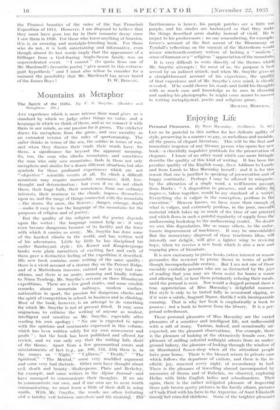Mountains as Metaphor
ANY experience which is more intense than usual gives us a standard by which we judge other things we value, and a language in which we think of them, and as ,ye connect it with thin in our minds, so our passion for it grows. The cricketer draws his metaphors from the game, and sees morality as ari extended version of the rules of sportsmanship. The sailor thinks in terms of the sea, the soldier in terms of war, and when they discuss their –trade their words have, for them, a significance , far beyond the apparent meaning. So, too, the man who climbs mountains, and sometimes the man who only sees mountains, finds in them not only metaphors and ,similes for a dozen different situations but also symbols for those profound experiences which are not " Objective " scientific events at all. To climb a difficult mountain may require memorable endurance, skill, fore- thought and determination ; but even if we do not climb them, their huge bulk, their remoteness from our ordinary interests, their nearness to the clouds, impress themselves upon us, and the range of things connected with the mountain
storm, the snow, the flowers ; danger, courage, death -,----make it easy to use the language of the mountains for the purposes of religion and of poetry.
' ut the quality of the religion and the poetry depends upon the writer': . the language cannot help ; it may even become dangerous because of its facility and the force With which it carries us away. Mr. Smythe has done some Of the hardest climbs in the world, and has written well of his adventures. Little by little he has disciplined his earlier flamboyant style : his garnet and Kangehenjuuga books were plain narratives of exciting fact and each of them gave a distinctive feeling of the expedition it described. His new book contains some writing of the same quality : there is a vivid account of a stormy day on the Peteret Ridge, and of a Matterhorn traverse, carried out in very bad con- ditions, and there is an acute, amusing and kindly tribute to.Nima TendruP, Mr. Smythe's servant on three Himalayan expeditions. There arc a few good stories, and some sensible remarks about mountain railways, .modern warfare, nationalism in 'Sport, the passion for dangerous climbs, and the spirit of competition in school, in business and in climbing. Most of the book; hoWever, is an attempt" to do something for which Mr. Smythe is not at present fitted. It may seem ungracious to criticise the writing of anyone as modest, intelligent and sensitive as Mr. Smythe; especially after reading his own apology : " so one is expected to agree with the opinions and sentiments expressed in this volume, which has bcen written solely for my own amusement and profit " ; but the book has been puhlished. and 'Offered for review, and we can only say thaf 'the- writing falls short of the theme. Apart from a few grammatical. errors and misstatements of fact (e.g., pp. 106, 152, 256) there is, in the essays on " Night," " Ugliness," "'Death," " The' Spiritual," " The Mental," some .very muddled argument and some very bad rhetoric. Other, men have thought about evil, death arid beauty--:Shakespeare, Plato and Berkeley, for example, and Smile writers in the Alpine Journal--and haVe managed to communicate their thoughts. If we are to ‘'communicate our own, and if our own are to seem worth communicating, we must learn a little of their skill in using words. With. Mr. Smythe, the words -often irritating anda tawdry veil between CantelveS 'and' facetiousneks is heavy,- his purple patches arc a little too purple, and his similes are hackneyed so that they make the things described seem shabby instead of vivid. He is unjust to his predecessors : no one remembering, for example, Grove's..' account of the first ascent of - the Bionnassay or. Tyndall's 'reflections on the summit of the Matterhorn would. accuse nineteenth-century writers of lacking a " modern sense of humour or a " religious " appreciation of the mountain. It is very difficult to write directly of the themes whi4 Mr. Smythe attemptS for, most of us, the purpose is best': served by an indirect ottack;lind when Mr. Smythe gives us a straightforward account of his experience, the quality . of that experience and of Mr. Smythe's own mind, is eleaily: revealed. if .he could choose his words and build-his thought s with as much care and knowledge as he uses in choosing and making his photographs, he might come nearer to success in writing metaphysical, poetic and religious prose.
MICHAEL ROBEWN.






























































































 Previous page
Previous page